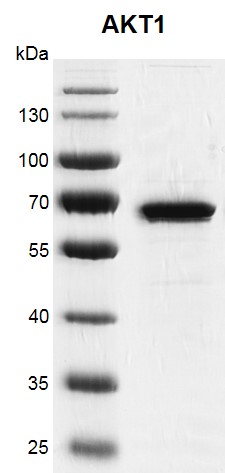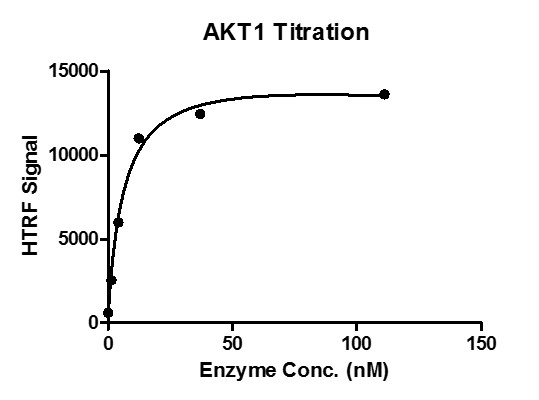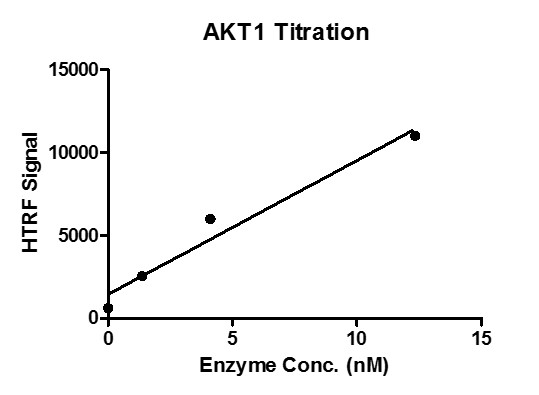Recombinant AKT1 protein
Expressed In
Baculovirus
Protein Species
Human
Cat No : 81145,81845 81145
验证数据展示
产品信息
| Expressed In | Baculovirus |
| Protein Species | Human |
Contents
Recombinant AKT1 protein is supplied in 25 mM HEPES-NaOH pH 7.5, 300 mM NaCl, 10% glycerol, 0.04% Triton X-100, and 0.5 mM TCEP.
背景介绍
AKT1 (AKT Serine/Threonine Kinase 1), also known as Protein Kinase B Alpha, PRKBA or PKB Alpha, is one of 3 closely related serine/threonine-protein kinases (AKT1, AKT2 and AKT3) called the AKT kinase, and which regulate many processes including metabolism, proliferation, cell survival, growth and angiogenesis. This is mediated through serine and/or threonine phosphorylation of a range of downstream substrates. Over 100 substrate candidateshave been reported so far, but for most of them, no isoform specificity has been reported. AKT is responsible of the regulation of glucose uptake and the storage of glucose. It also regulates cell survival via the phosphorylation of MAP3K5 (apoptosis signal-related kinase), mediates insulin-stimulated protein synthesis by phosphorylating TSC2. AKT is involved in the phosphorylation of members of the FOXO factors (Forkhead family of transcription factors), leading to binding of 14-3-3 proteins and cytoplasmic localization. AKT has an important role in the regulation of NF-kappa-B-dependentgene transcription and positively regulates the activity of CREB1 (cyclic AMP (cAMP)-response element binding protein). The Rho GTPase-activating protein DLC1 is another substrate and its phosphorylation is implicated in the regulation cell proliferation and cell growth. AKT plays a role as key modulator of the AKT-mTOR signaling pathway controlling the correct neuron positioning, dendritic development and synapse formation. AKT1-specific substrates have been recently identified, including palladin (PALLD), which phosphorylation modulates cytoskeletal organization and cell motility; prohibitin (PHB), playing an important role in cell metabolism and proliferation; and CDKN1A, for which phosphorylation at Thr-145 induces its release from CDK2 and cytoplasmic relocalization. Theserecent findings indicate that the AKT1 isoform has a more specific role in cell motility and proliferation.
Application Notes
This product was manufactured as described in Protein Details. Where possible, Active Motif has developed functional or activity assays for recombinant proteins. Additional characterization such as enzyme kinetic activity assays, inhibitor screening or other biological activity assays may not have been performed for every product. All available data for a given product is shown on the lot-specific Technical Data Sheet.
Protein Details
Recombinant AKT1 protein was expressed in a baculovirus expression system as the full length protein (accession number NP_005154.2) with an N-terminal 6xHis and FLAG tag. The molecular weight of the protein is 60.5 kDa.
Storage
Recombinant proteins in solution are temperature sensitive and must be stored at -80°C to prevent degradation. Avoid repeated freeze/thaw cycles and keep on ice when not in storage.
Guarantee
This product is guaranteed for 6 months from date of receipt.
This product is for research use only and is not for use in diagnostic procedures.



